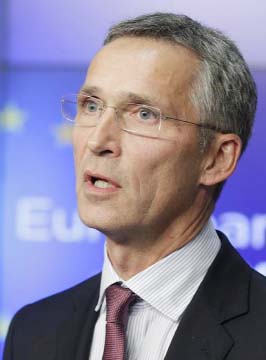
AP, Tallinn :
NATO’s chief said Thursday that Russia’s growing military presence in the skies above the Baltic region is unjustified and that its aircraft regularly fail to file flight plans or communicate with air controllers, and fly with their transponders off, posing a risk to civil aviation.
At the Amari air base in Estonia, NATO Secretary General Jens Stoltenberg said alliance fighters have intercepted planes more than 100 times in the region so far this year, a threefold increase on 2013. But he didn’t say how many of them were Russian.
Stoltenberg said the alliance “should stay vigilant” because Russia has increased its military air activity in the Black Sea and Norwegian Sea, as well as the Baltic area, even though most of the flights occurred in international airspace.
He said NATO aircraft have conducted 400 intercepts to protect the airspace of European alliance members – an increase of 50 percent from last year.
“It’s a pattern we haven’t seen for many years and which should remind us of the way they (Russians) conducted this kind of military air activity in the time of the Cold War,” Stoltenberg said.
At a joint news conference with Estonian Prime Minister Taavi Roivas, Stoltenberg said NATO is “ready to react when needed.”
Roivas said, “Russia’s actions in and around Ukraine have been very aggressive. They act as a very powerful wake-up call.”
After being forcibly annexed by the Soviet Union in 1940, then again from 1944 to 1991, Estonia and the other two Baltic countries – Latvia and Lithuania – have viewed Russia’s annexing of Crimea and backing of rebels fighting in nearby eastern Ukraine with trepidation. These countries also have voiced concern about Russia’s military presence in their region.
NATO has stepped up its air, land and sea rotations in the Baltic countries and raised the number of fighter jets patrolling the region from four to 16.
In September, President Barack Obama said during a visit to Tallinn that he would send more air force units and aircraft to the Baltics, including the Amari Air Base.
NATO says it regularly launches jets to identify “unknown or potentially hostile aircraft” in the proximity of national airspace in the region.
NATO’s chief said Thursday that Russia’s growing military presence in the skies above the Baltic region is unjustified and that its aircraft regularly fail to file flight plans or communicate with air controllers, and fly with their transponders off, posing a risk to civil aviation.
At the Amari air base in Estonia, NATO Secretary General Jens Stoltenberg said alliance fighters have intercepted planes more than 100 times in the region so far this year, a threefold increase on 2013. But he didn’t say how many of them were Russian.
Stoltenberg said the alliance “should stay vigilant” because Russia has increased its military air activity in the Black Sea and Norwegian Sea, as well as the Baltic area, even though most of the flights occurred in international airspace.
He said NATO aircraft have conducted 400 intercepts to protect the airspace of European alliance members – an increase of 50 percent from last year.
“It’s a pattern we haven’t seen for many years and which should remind us of the way they (Russians) conducted this kind of military air activity in the time of the Cold War,” Stoltenberg said.
At a joint news conference with Estonian Prime Minister Taavi Roivas, Stoltenberg said NATO is “ready to react when needed.”
Roivas said, “Russia’s actions in and around Ukraine have been very aggressive. They act as a very powerful wake-up call.”
After being forcibly annexed by the Soviet Union in 1940, then again from 1944 to 1991, Estonia and the other two Baltic countries – Latvia and Lithuania – have viewed Russia’s annexing of Crimea and backing of rebels fighting in nearby eastern Ukraine with trepidation. These countries also have voiced concern about Russia’s military presence in their region.
NATO has stepped up its air, land and sea rotations in the Baltic countries and raised the number of fighter jets patrolling the region from four to 16.
In September, President Barack Obama said during a visit to Tallinn that he would send more air force units and aircraft to the Baltics, including the Amari Air Base.
NATO says it regularly launches jets to identify “unknown or potentially hostile aircraft” in the proximity of national airspace in the region.

